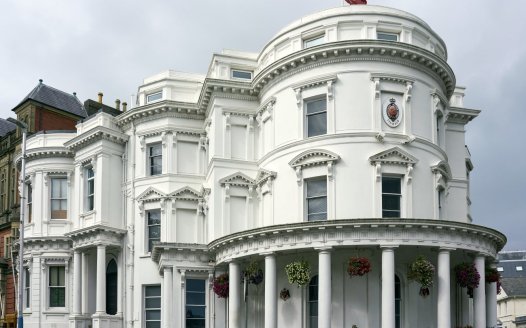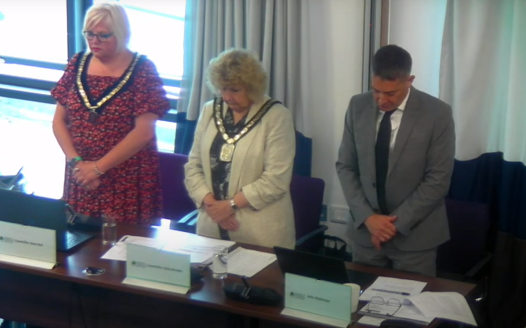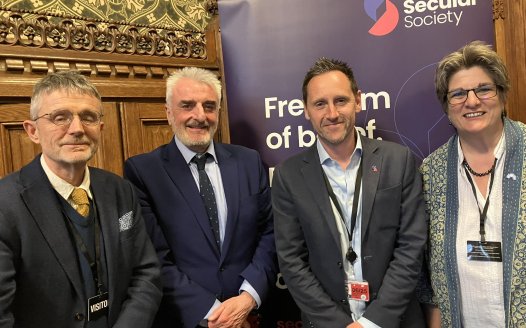New Government backed council prayers bill will 'undermine religious freedom'
Posted: Thu, 18th Dec 2014
The National Secular Society has accused the Government of seeking to undermine religious freedom by supporting a Private Members' Bill to include "prayers or other religious observance" in the business of local authority meetings.
The Local Government (Religious etc. Observances) Bill, proposed by Jake Berry MP but prepared by the Department for Communities and Local Government, is in response to a High Court case where the National Secular Society and a local councillor successfully argued that council meetings should be conducted in a manner equally welcoming to all councillors, regardless of their religious beliefs, or lack of belief.
The High Court ruled that "the saying of prayers as part of the formal meeting of a Council is not lawful under s111 of the Local Government Act 1972, and there is no statutory power permitting the practice to continue."
In supporting the Bill to overturn the ruling, The National Secular Society accused the Secretary of State of "seeking to impose religion by tyranny of the majority."
Authorising public expenditure arising from the Bill in Parliament on Tuesday, Penny Mordaunt, the Parliamentary Under-Secretary of State for Communities and Local Government, said: "The Bill will not compel anyone to pray or any local authority to include prayers in their official business, nor does it define what constitutes prayer."
Labour MP Lyn Brown said she was "content, on behalf of the Opposition, to wish the Bill and its purposes well."
She said: "I welcome the fact that the Bill is not prescriptive. It will leave it to local communities to determine what, if any, observances are appropriate to them; where they should be placed on the agenda; and whether they should be faith-based or otherwise." Brown added that, "we must see this as a matter of local choice."
Jake Berry, the Bill's proposer, stated: "As we approach Christmas, the celebration of the birth of who I believe to be the Prince of Peace, all elected officials might like to reflect that there may be more power in prayer than in any stroke of a Minister's pen or ruling from the Chair, and that this Bill, which seeks to protect people's freedom to pray, will enable people of all religious beliefs to seek guidance in their deliberations in elected office."
Stephen Evans, National Secular Society campaigns manager, said: "The supporters of this Bill are being willfully misleading by citing religious freedom, when the actual purpose of the Bill is to undermine religious freedom by enabling one group of councillors to impose their beliefs on other, equally elected, councillors."
"This Bill needs to be exposed for what it is, an attempt by religious enthusiasts to push their religion into the public sphere."
"The High Court ruling did not deprive any councillor of the right to pray; the ruling did however prevent local authorities from summoning councillors to religious observance at council meetings and hence imposing it on those that do not wish it. Religious freedom demands that an individual's right to manifest their religion must always be balanced against others' rights to live their lives free from religion."
"Allowing worship to be imposed in a secular environment, as the Bill would do, is incompatible with a genuine commitment to religious freedom and inimical to ensuring our local councils are equally welcoming to all sections of society. If successful, this legislation could also open the door to wholly unnecessary conflict and sectarian squabbles within local authorities."
Mr Berry's proposal would allow "prayers or other religious observance" or "observance connected with a religious or philosophical belief."
As well as council meetings, the Bill explicitly allows prayer in a vast range of other authorities, including the "Passenger Transport Executive of an integrated area in England", a "joint waste authority", "an internal drainage board for a district neither wholly not partly in Wales."
Mr Evans added: "Before any more parliamentary time and expense is taken up by this Bill, its backers should be obliged to explain how putting prayers on the agenda of a joint waste authority meeting will assist it in carrying out its functions."
Following the High Court ruling in favour of the NSS in 2012, Eric Pickles, the Secretary of State for Communities and Local Government (a committed evangelical Christian and now Minister for Faith), fast-tracked the implementation of new legal power contained in the Coalition Government's Localism Act 2011, which he claimed gave "councils back the freedom to pray" – although his interpretation was contested by the NSS and some lawyers.
The Department for Local Government now concedes that "smaller parish councils do not have this power and neither do a range of single-purpose authorities such as fire and rescue authorities, and integrated transport authorities" and is now backing Mr Berry's bill to give council prayers a statutory basis in them all.
The Bill will be debated at Committee Stage on 6 January 2015
Read the NSS briefing on the Local Government (Religious etc. Observances) Bill here







